 |
Convert EVO to H.264
|
EVO to H.264 Converter Software converts EVO files to H.264. With
an easy-to-use interface, it makes EVO to H.264 conversion routine as easy
as 1-2-3, without knowledge of EVO and H.264. The converter helps any beginners
and experts to create high quality video files in minutes. This program encodes
EVO to H.264 with professional quality. The EVO to H.264 Converter Software enables
more people enjoy the advantage about this advanced video
coding. The H.264 is one of HTML5 video formats, you can also
put the H.264 video to your website.
The software could convert more than 100 media foramts to popular video formats
and portable devices such as MKV, Windows Phone, 3G2, PPM image sequence, iPod, M4B (MPEG-4 audiobook), ASF, etc. It could convert RM to DivX, M4V to WMV, EVO to BMP image sequence, DAT to MP3, VOB to Android Phone,
and so on.
EVO to H.264 Converter Software supports batch conversion and,
is full compatible with 32-bit and 64-bit editions of Windows 10/8/7/Vista/XP/2000.

What is EVO?
An EVO file (Enhanced VOB) is a container format contained in HD DVD video
media. All HD DVD titles use UDF version 2.5 as the file system. In this
file system, multiplexed audio and video streams are stored in EVO container
format. HD DVD competed primarily with Blu-ray Disc. Both formats were
designed as successors to DVD, capable of higher quality video and audio
playback, and of greater capacity when used to store video, audio, and
computer data. There is also a hybrid HD DVD format which contains both
DVD and HD DVD versions of the same movie on a single disc, providing a
smooth transition for the studios in terms of publishing movies, and allowing
consumers with only DVD players to still use the discs. Blu-ray Disc and
HD DVD share most of the same methods of encoding media onto discs with
each other, resulting in equivalent levels of audio and visual quality,
but differ in other aspects such as interactive capabilities, internet
integration, usage control and enforcement, and in which features were
mandatory for players. The extensions are in the form of private stream
data and their interpretation. The HD DVD Promotion Group was dissolved
on March 28, 2008. However, the HD DVD physical disc specifications (but
not the codecs) are still in use as the basis for the China Blue High-definition
Disc (CBHD) formerly called CH-DVD. Backward compatibility is available
with all HD DVD players, allowing users to have a single player to play
all types of HD DVD, DVD and CD. HD DVD-RAM has a single-layer capacity
of 20 GB. Like the original DVD format, the data layer of an HD DVD is
0.6 mm below the surface to physically protect the data layer from damage.
What is H.264?
H.264 is a video compression codec that is used on MPEG-4 videos. It supports
high resolution and compressions to give you stunning video pictures. Baseline
Profile (BP): Primarily for low-cost applications that require additional
data loss robustness, this profile is used in some videoconferencing and
mobile applications. This profile includes all features that are supported
in the Constrained Baseline Profile, plus three additional features that
can be used for loss robustness (or for other purposes such as low-delay
multi-point video stream compositing). The importance of this profile has
faded somewhat since the definition of the Constrained Baseline Profile
in 2009. All Constrained Baseline Profile bitstreams are also considered
to be Baseline Profile bitstreams, as these two profiles share the same
profile identifier code value. Both the Blu-ray Disc format and the now-discontinued
HD DVD format include the H.264/AVC High Profile as one of 3 mandatory
video compression formats. The JVT was (is) chaired by Gary Sullivan, Thomas
Wiegand, and Ajay Luthra (Motorola, USA). While MPEG-4 Part 10 is an ISO/IEC
standard, it was developed in cooperation with the ITU, an organization
heavily involved in broadcast television standards. These extensions enabled
higher quality video coding by supporting increased sample bit depth precision
and higher-resolution color information, including sampling structures
known as Y'CbCr 4:2:2 (=YUV 4:2:2) and Y'CbCr 4:4:4. The Multiview Video
Coding extensions were completed in November 2009. AVCHD is a high-definition
recording format designed by Sony and Panasonic that uses H.264 (conforming
to H.264 while adding additional application-specific features and constraints).
How to Convert EVO to H.264?
- Free Download
EVO to H.264 Converter Software
- Install the Program by Step-by-step Instructions
- Launch EVO to H.264 Converter Software
- Choose EVO Files

Click "Add Files" to choose EVO files.
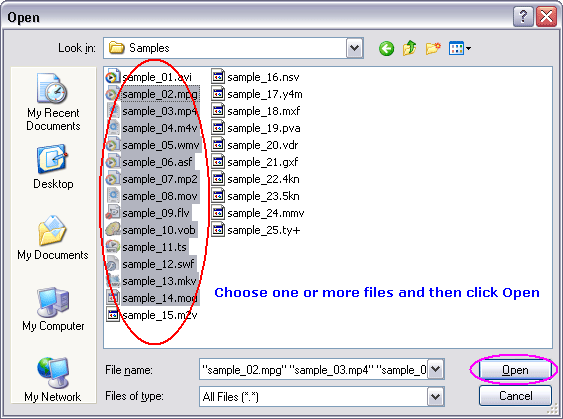
Choose one or more EVO files you want to convert and then click Open.
EVO to H.264 Converter Software will open EVO files and get file information
of the file such as width, height, frame rate, video bit rate, audio sample rate,
audio bit rate, audio channels, and then display the information of EVO file
at conversion list.
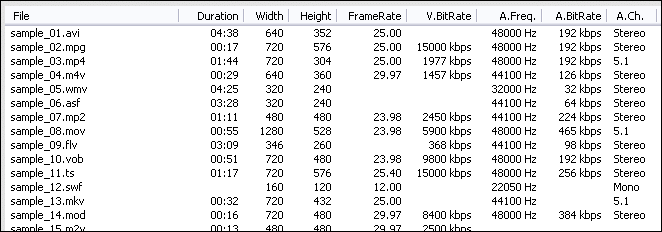
- Choose Output Format
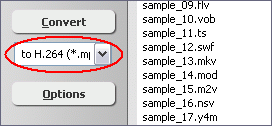
Click on combo box of output format and then choose "to H.264".
- [Optional, for advanced user]
Set H.264 Encoding Parameters
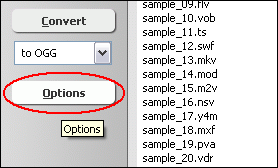
If you want to change H.264 encoding parameters such as bit rate, frame rate,
video size, and aspect ratio, please click "Options".
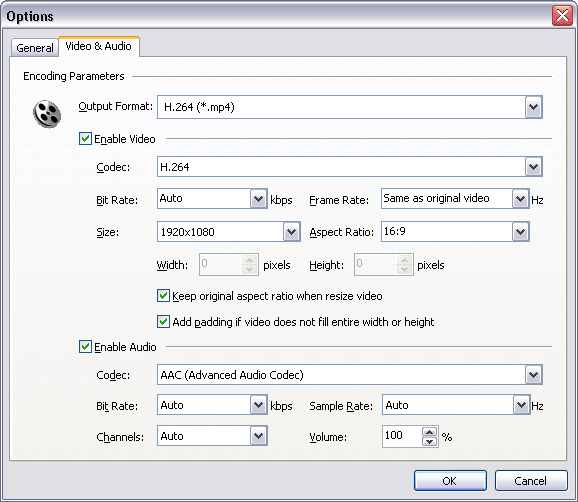
And then, switch to tab "Video & Audio" and choose "H.264
(*.mp4)" at "Output Format", and then set options for
video and audio.
- Convert EVO to H.264
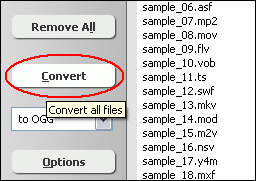
Click "Convert" to convert all EVO files in list to H.264 format.

The software is converting EVO files to H.264.
- Play & Browse
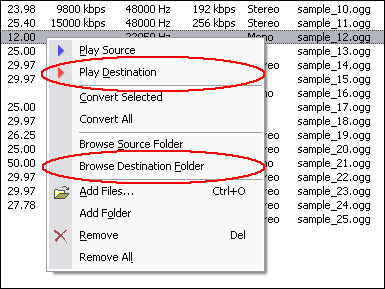
When conversion completes, you can right-click converted item and choose "Play
Destination" to play the outputted H.264 file; or choose "Browse
Destination Folder" to open Windows Explorer to browse the outputted H.264
file.
- Done
Top
EVO to H.264 Converter Software is 100% clean and safe to
install. It's certified by major download sites.

Convert EVO to H.264 Related Topics:
|











